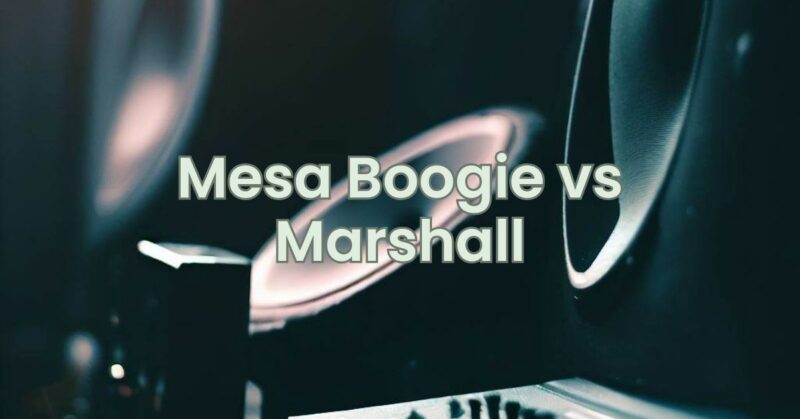When it comes to guitar amplifiers, few brands have achieved the legendary status and iconic sound of Mesa Boogie and Marshall. These brands have shaped the sound of rock music for decades, with each offering its unique sonic characteristics and loyal fan bases. In this article, we will compare Mesa Boogie and Marshall amplifiers, exploring their features, tonal profiles, and key differences to help you make an informed decision when choosing the right amplifier for your playing style.
- Mesa Boogie Amplifiers:
Mesa Boogie is renowned for its innovative designs and high-quality craftsmanship. Here are some key aspects of Mesa Boogie amplifiers:
- Tonal Versatility: Mesa Boogie amplifiers are known for their versatility, offering a wide range of tones suitable for various musical genres. They often feature multiple channels, switchable voicings, and comprehensive EQ options, allowing players to dial in anything from sparkling cleans to high-gain distortion. Mesa Boogie amps excel at delivering tight, punchy low-end response and dynamic, responsive tones.
- Unique Tube Circuits: Mesa Boogie is recognized for its unique tube circuit designs, such as the Dual Rectifier, Mark series, and Lone Star models. These circuits offer distinctive tonal characters and amp voicings, with an emphasis on tight low-end response, saturated gain, and dynamic touch sensitivity. Mesa Boogie amps often utilize multiple power tubes and offer selectable wattage options for different playing environments.
- Build Quality and Customization: Mesa Boogie amplifiers are known for their exceptional build quality and attention to detail. They are hand-built using high-quality components and materials, ensuring reliability and longevity. Mesa Boogie also offers a range of customization options, allowing players to tailor their amps to their specific needs with different speaker configurations, tube choices, and additional features.
- Marshall Amplifiers:
Marshall is synonymous with the sound of classic rock and has been a staple on stages around the world for decades. Here are some key aspects of Marshall amplifiers:
- Iconic British Tone: Marshall amplifiers are famous for their classic British rock tones. They often exhibit a characteristic mid-range emphasis, creamy overdrive, and a distinctive “Marshall crunch.” Marshall amps excel at producing rich, harmonically complex distortion tones that have become synonymous with the golden era of rock music.
- Simplicity and Raw Power: Marshall amplifiers typically feature straightforward controls, focusing on delivering pure, raw, and powerful tones. They prioritize simplicity and a plug-and-play approach, offering players a straightforward interface for achieving their desired sound. Marshall amps often have a dynamic response and can be pushed to create natural tube saturation and harmonic richness.
- Rich Heritage: Marshall has a rich history and is associated with legendary guitarists and bands. Their amplifiers have played a significant role in shaping the rock genre and continue to be used by countless professionals and enthusiasts worldwide.
Choosing between Mesa Boogie and Marshall amplifiers depends on your musical preferences, playing style, and desired tones. Mesa Boogie amplifiers offer tonal versatility, unique tube circuits, and customization options, making them suitable for players who seek a wide range of sounds and appreciate attention to detail. Marshall amplifiers, on the other hand, provide iconic British rock tones, simplicity, and raw power, catering to those who crave the classic Marshall crunch and mid-range focus.
Ultimately, it’s crucial to try out different models from both brands, consider your playing style and preferred genres, and listen to how they interact with your guitar and effects setup. Both Mesa Boogie and Marshall have solid reputations for delivering exceptional amplifiers, and finding the one that resonates with your musical vision is a matter of personal taste and experimentation.


